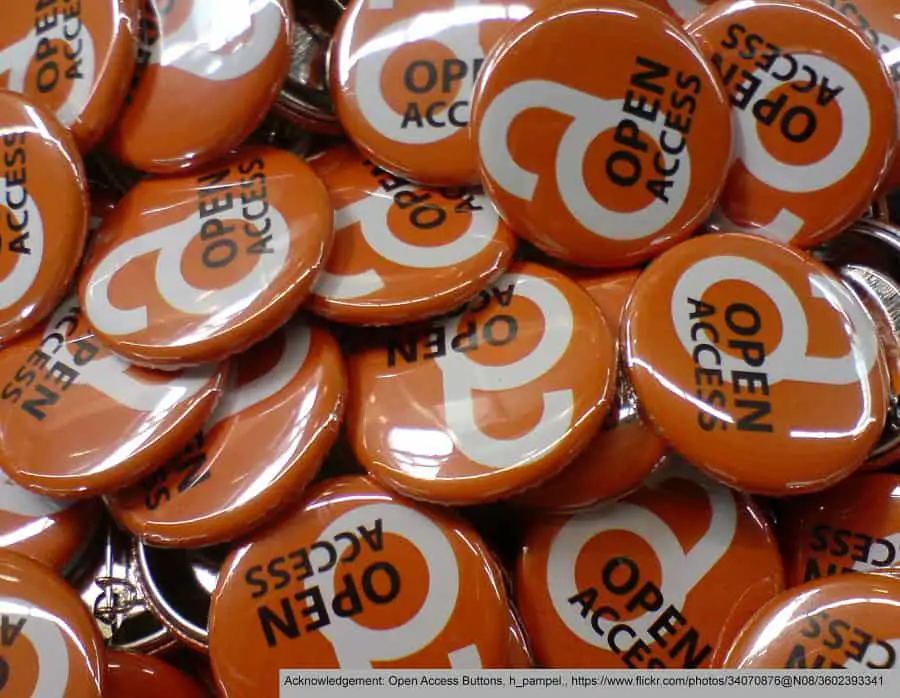Disclosure: This page may contain affiliate links. This means, at no additional cost to you, we receive a commission if you click through and make a purchase.
Is open access the same as predatory publishing? The answer is no.
Most would agree that open access publishing is a good idea, but it does come with unintended consequences, with one of those being the rise of predatory publishers. This is something that the scientific community must deal with, else we run the risk of not being able to trust the scientific archive, which underpins almost everything we do in our role as researchers, scientists and scholars.
This article presents an overview of open access and predatory publishing. Then we consider the implications of predatory publishing and the danger it presents, not only to the scientific community, but also to an individual’s CV.
What is Open Access?
Before open access, when you wrote a scientific paper, you signed over the copyright to a publisher, who then generated income by selling the paper either by charging institutions or individuals a subscription or by charging a fee to access the article.
Open access gives you the opportunity to publish your scientific research in a way that makes it available to anybody who wishes to read it. That is, nobody has to pay to read your article. It is free to access.
In the open access model, the author, or their institution, pays to publish their article. These costs may also be covered by another body such as a learned society, research institute, funding body etc. This means that the publisher generates their income from the publication fees, rather than selling the article after it has been published. Authors and institutions may not be happy as they have to pay to publish their own papers, and may still have to subscribe to the journal, but that is a discussion for another article.
This model of open access, where you pay the publisher to publish your article, is known as “Gold Open Access“. There are other models, where you can still put your article online, you don’t pay, yet your article is still freely available. We will cover the various open access model in another article but this StackExchange post does a good job. You might prefer a book and we have found “Open Access (MIT Press Essential Knowledge Series)” a useful resource. We have also linked to a video (see below).
What is Predatory Publishing?
Predatory publishing is an unintended consequence of the open access movement.
Seeing an opportunity, some “publishers” (and we put publishers in quotes on purpose) have set up bogus journals which promises quick review times, fast publication times and generally make all sorts of claims about their editorial board, impact factors etc., many of which cannot be substantiated or verified. In truth, many of them are little more than works of fiction.
There is likely to be no peer review, the paper will not be checked in any way for quality, robustness, reproducibility; and many other aspects of scientific publishing that we would expect from a credible publisher. You submit an article, it is accepted, and you are expected to pay.
Moreover, the article is unlikely to get any citations and the paper will have no impact. To be frank, it is a good thing if papers published in predatory journals do not attract citations, as we do not want papers that have not been robustly peer reviewed to infect the scientific archive.
Predatory publishers are in it for the money. They just want you to send your article to them, they will publish it and charge you for the privilege. More importantly, when other researchers read your paper they may not (will not) be aware that your paper is no better than a blog post (in fact, many blog posts are probably better) and will accept it with the same faith as they would for any other journal article. After all, this is what the scientific method is all about. It gives researchers confidence that what they are reading research has been reviewed by experts in that domain. In the case of predatory journal articles, this is not the case.
A word of caution. Some people might believe that publishing any paper is better than publishing no paper. This is not true and we have explained, in another article, how publishing in a predatory journal can harm your CV. We urge you to avoid predatory journals at all costs.
Implications of predatory publishing
The scientific method
The tension between open access and predatory publishing arises when a rogue publisher sees an opportunity to make money, without providing the usual services that would be expected from a traditional publisher.
Not only will predatory publishers make money for providing an unethical service, but the scientific method is not being respected. This is the process that researchers follow so that other researchers can have confidence in the papers that are published. If a paper is published in a scientific journal, it is assumed that the scientific method has been followed. It is a dangerous road if we no longer have confidence that the scientific method has been respected.
If you are interested in finding out more about the scientific method, you might want to take a look at “A Beginner’s Guide to Scientific Method (4th Edition)” (link to Amazon here).
The scientific archive
Another major issue is the infection of the scientific archive. If scientific papers are being accepted into the scientific archive, when the paper has not been through a robust peer review process, this not only undermines the scientific archive but is potentially dangerous.
If authors are making claims that are not substantiated (or at least not accepted through a rigorous peer review process), yet these papers are published it could lead to researchers, even the general public, applying these findings with potentially severe consequences. For example, if a medical procedure or a new drug is presented in a predatory journal, this might be applied to a patient with potentially fatal results (recognizing that other checks and balances are in place in medicine, but this is not true for all disciplines).
We are sure that no researcher would want that on their conscious, but this is the risk they are taking, and they should be under no illusion that they are potentially risking the lives of the general public. Even if their predatory paper is not directly responsible, others could build on your paper, which could lead to fatalities.
Your CV and your legacy
A paper published in a predatory journal has no scientific credibility.
As academics, one of the most important things we have is our legacy which is, in large part, our scientific publication record. If your credibility as a scholar is called into question, how would you defend yourself if you have published in a predatory journal? Perhaps, more to the point, would you really want your legacy to be questioned after you had passed away and you do not have the opportunity to defend yourself?

In the short term, you may get another job based on your CV that includes predatory publications, you may even get promoted, but you are inevitably damaging both your career and your academic reputation. You might get away with it for years but, eventually, you will be exposed. This exposure may come after your academic career is over, perhaps, even after your death, but it will inevitably be recognized, and your other academic achievements are meaningless.
If you are tempted to publish in a predatory journal, in order to enhance your CV, you might want to take a look at one of our other articles which might persuade you that it will actually damage your CV, rather than enhance it.
Standing on the shoulders of giants
Another significant issue is that by publishing in a predatory journal, other researchers may develop this non-peer reviewed work, despite what the predatory journal may you believe about the high level of peer review. As a result, you may be wasting years of other researcher’s time if they try and develop your work, which is not founded on sound scientific principles, has not followed the scientific method and has not undergone robust peer review.
This is made even worse if some follow up work is published in a credible journal, which promotes the validity of the first article, even though it has not been validated by the scientific community. “Standing on the shoulders of giants” takes on a whole new meaning and might be better phrased as “Standing on the shoulders of fraudsters.”

If you are wondering where the phrase “Standing on the shoulders of giants” comes from, it has been first attributed to Bernard_of_Chartres, a 12th century French philosopher and scholar. Perhaps the more famous quote was from Isaac_Newton when he wrote to Robert Hooke in February 1676, saying “If I have seen further it is by standing on the shoulders of giants.“
This phrase has now come to represent the scientific process of developing the work of others to make advances in science. The term has become so ingrained into the scientific literature that even Stephen Hawking used it in a book titled, “On the Shoulders of Giants: The Great Works of Physics and Astronomy” (Amazon link here), where he presents some of the greatest scientific discoveries of all time.
It has also been used by others, outside of science, such as in the book giving the history of the football club Manchester United.
Wherever the term came from, if you publish in a predatory journal, you are not standing on the shoulder of a giant. You are conning the academic community and paying for the privilege.
Conclusion
Open access is generally well received and seen as a good direction of travel for the dissemination of research, especially when that research has been paid for by the tax payer.
However the introduction of open access publishing has provided a business opportunity for unscrupulous individuals and companies (we are loathed to call them publishers) to exploit the academic community, This is done by setting up open access journals, where a payment is required to have a paper published.
The difference between open access and predatory publishing is the lack (or maybe even complete absence) of peer review, or any of the other features we would expect from a traditional journal. This leads to the scientific archive being infected and, if we do nothing to control it, this infection will spread and will ultimately make the scientific archive meaningless.



